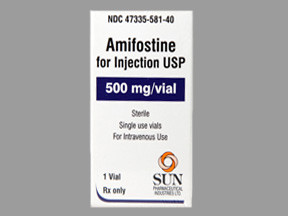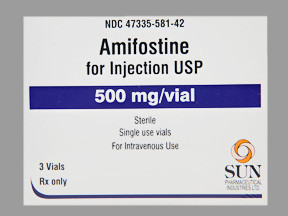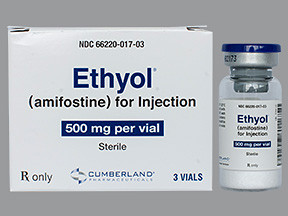AMIFOSTINE - INJECTION
PHONETIC PRONUNCIATION: (A-mi-FOS-teen)
COMMON BRAND NAME(S): Ethyol
GENERIC NAME(S): amifostine crystalline
Uses
USES: Amifostine is used to decrease the risk of kidney problems caused by treatment with a certain anti-cancer drug (cisplatin). It is also used to help prevent a certain side effect (dry mouth) caused by radiation treatment for head and neck cancer. Amifostine is thought to work by preventing certain chemicals from damaging healthy cells. It may also help repair cells damaged by cisplatin or radiation treatment.
How to use AMIFOSTINE - INJECTION
HOW TO USE: This medication is given by injection into a vein by a health care professional, usually 15 to 30 minutes before cancer treatment or as directed by your doctor. Dosage is based on your medical condition, body size, and response to treatment. To decrease the risk of a certain side effect (low blood pressure), your doctor may direct you to lie down while receiving this medication. Also, if you are taking blood pressure medication, your doctor may direct you to stop taking it for 1 day before receiving this drug. Be sure to ask your doctor when to restart blood pressure medication. To decrease the risk of side effects (e.g., low blood pressure), drink plenty of fluids while using this medication unless otherwise directed by your doctor.
Side Effects
Precautions
Interactions
Overdose
Images
Reviews
Faq for AMIFOSTINE - INJECTION
Amifostine Injection is used to prevent or reduce the side effects of certain cancer treatments, such as cisplatin chemotherapy or radiation therapy.
Amifostine Injection works by protecting normal cells from the harmful effects of cancer treatments. It helps prevent damage to organs such as the kidneys during chemotherapy or radiation.
Amifostine Injection is given as an intravenous (IV) infusion by a healthcare professional. The dosage and duration of treatment may vary depending on the specific cancer treatment being received.
The common side effects of Amifostine Injection can include nausea, vomiting, low blood pressure, flushing, and allergic reactions. Your healthcare provider will monitor you for these side effects during treatment.
Amifostine Injection may interact with certain medications, so it is important to inform your healthcare provider about all the medications you are taking. It is also important to tell your doctor if you have any pre-existing medical conditions, such as kidney problems.
It is important to follow your healthcare provider's instructions for the use of Amifostine Injection. This may include pre-medication to prevent certain side effects or following a specific schedule for administration.
Amifostine Injection should be used during pregnancy only if the potential benefits outweigh the potential risks. It is not known if Amifostine passes into breast milk, so it is recommended to avoid breastfeeding during treatment.
The coverage of Amifostine Injection by insurance plans may vary. It is recommended to check with your insurance provider to determine the coverage and any potential out-of-pocket costs.
Amifostine Injection may cause dizziness or low blood pressure, which can affect your ability to drive or operate machinery. It is recommended to talk to your healthcare provider about any potential restrictions or precautions.
Disclaimer
IMPORTANT: HOW TO USE THIS INFORMATION: This is a summary and does NOT have all possible information about this product. This information does not assure that this product is safe, effective, or appropriate for you. This information is not individual medical advice and does not substitute for the advice of your health care professional. Always ask your health care professional for complete information about this product and your specific health needs.



No Reviews Yet